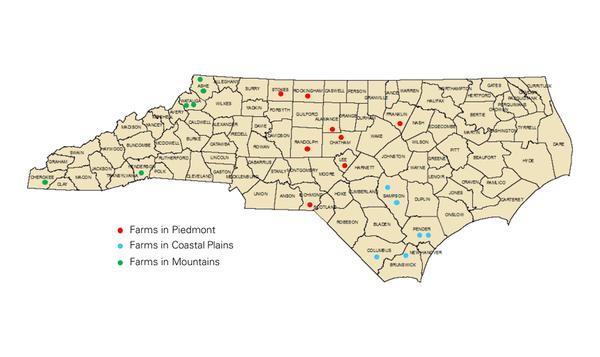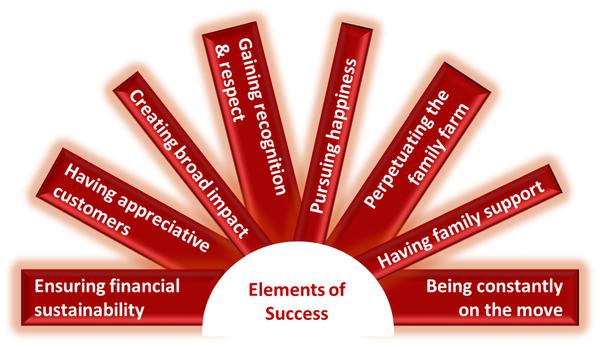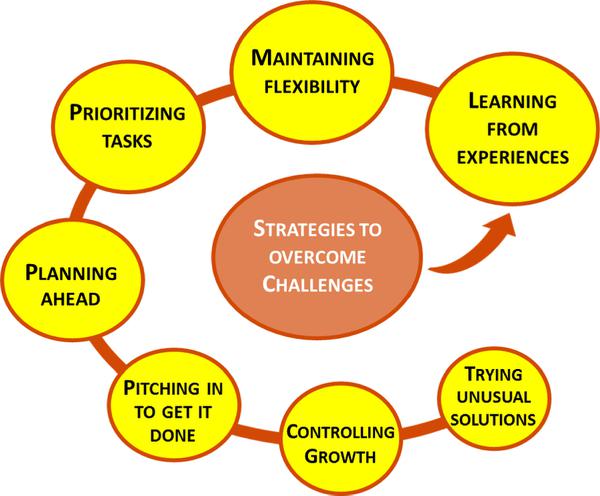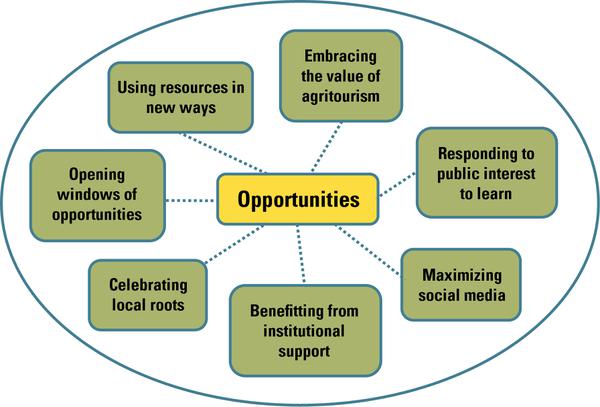Why Learn More about Women in Agritourism?
Offering recreational and educational activities on working farms, commonly called agritourism, has become a popular way to supplement agricultural income and to stimulate rural economies across the United States (Gil Arroyo et al., 2013). In North Carolina, the number of agritourism farms and the revenues from agritourism activities have grown considerably over the last decade (USDA: NASS, 2012). As agritourism increases in prominence, it is important to pay attention to the roles of women in this activity as they are instrumental to its development, maintenance, and innovation. Learning about women’s involvement in agritourism is especially needed because women tend to be less economically successful than men in this sector (Barbieri & Mshenga, 2008), mainly because they operate in a male dominated industry (McGehee & Kim, 2004).
Given the increasing number of women involved in agriculture, their pivotal role in agritourism, and their lower economic success than men, it is critical to assess the entrepreneurial reality from women’s perspectives. In response, we conducted a study in 2015 to document how women in North Carolina envision their agritourism success, the challenges they face, and the opportunities they see to further develop their enterprises. We interviewed 20 women whose agritourism operations are located across three North Carolina regions (Figure 1). The participants were identified by key private and public stakeholders across the state1.
Footnotes
- We collected data using a mix of qualitative methods, mainly interviews and focus groups. We audio-recorded the conversations (totaling 650 minutes), transcribed them verbatim, and analyzed the data through thematic coding. To protect the confidentiality of participants, we used aliases in lieu of real names and removed details that can identify them. We inserted (…) to indicate unnecessary text removed from quotes.↵
Who Participated in the Study?
Study participants were in their mid-twenties to early seventies; most had children whose age ranged from toddlers to adults. Five participants held off-farm jobs in addition to their farming responsibilities. Eleven women turned to farming in retirement or after being laid-off from previous jobs. Two participants were African-American and the remaining were non-Hispanic white.
Participating women were involved in a wide breadth of agricultural production and agritourism activities. Most had animals (poultry, small and large livestock), small-scale gardens (herbs, flowers, vegetables), or value-added products (preserves, ciders). A few had row crops, specialty crops, fruit orchards, and produced honey. The most common agritourism offerings were tours, school field trips, and picnic facilities. Some offered pick-your-own and other farm-based recreation, such as corn mazes and hay rides, accommodation facilities (e.g., guesthouses, camp sites), and venues for events.
How do Women in Agritourism Understand Success?
Participating women viewed success as being composed of eight aspects: ensuring financial sustainability, having appreciative customers, creating broad impact, gaining recognition and respect, pursuing happiness, perpetuating the family farm, having family support, and being constantly on the move (Figure 2). These aspects were present across women’s life-cycle stages. However, farmers in their twenties and thirties did not discuss perpetuating the family farm as an aspect of success. This may be due to the fact they are in the early stages of their family and entrepreneurial paths.
Ensuring financial sustainability, unsurprisingly, was a crucial aspect of women’s success because their farms and enterprises were their main sources of livelihood. Participants also cited having appreciative customers as an aspect of success because it builds long-term relationships and ensures customers’ satisfaction.
- “I feel most successful when people taste my cheese and go crazy about it. I just really like it. It makes all that other [agricultural] hard work worthwhile.” (Rose)
Creating a broad impact in society, especially by supporting local businesses and inspiring future generations, was also a central aspect of participants’ success.
- “I feel that I’m successful because we’re training kids [young employees], and most of the time they go on to college (…) And you know, that just makes us feel good that we’ve trained these kids and we’ve had a hand in their education and they’re going on to do bigger and brighter things.” (Emma)
The participants’ passion for their farming livelihoods drove them to become experts in their fields. As such, gaining recognition and respect for the quality of their products and services was an important aspect of their success. Also in tune with agriculture, women viewed pursuing happiness through farming and perpetuating the farm, in terms of farmland and practice, as other important aspects of their success. Regardless of its direct (such as helping with farm chores) or indirect (such as emotional encouragement) nature, having family support was also important to their success.
Irrespective of age, women mentioned that agritourism gave them the opportunity of being constantly on the move, an agritourism aspect that added to their understanding of success. This aspect was especially important to older farmers who wanted to stay active. For some participants, this also meant the constant effort to innovate farm offerings to ensure quality while their businesses were growing.
- “We do this [agritourism farm] as something to keep us active in retirement. I don’t want to, we don’t want to just sit and rot away.” (Claire)
Participants rejected the popular belief that work-life balance was an element of success as many doubted whether attaining such balance as a farmer was feasible. However, some acknowledged using strategies to reduce their farm workload or to lower their household expectations as a way to pursue some work life balance.
- “I try to get home and get my stuff done in the home but it’s livable. The hardest part for me is getting the house cleaned up and all that stuff, and I have to quit trying to expect myself to do that.” (Abby)
What Challenges do Women in Agritourism Face?
Participants identified nine challenges that women in agritourism often encounter. We summarize them below from the most to the least prevalent. Two challenges, managing business growth and struggling to perpetuate the family farm, did not appear among younger women, not even among those who came from multigenerational farms.
1. Lacking reliable staff → Mainly due to the seasonality of farming and agritourism.
“I was looking for wreath makers. It’s very seasonal. It’s hard to find people who just want temporary work for four weeks out of the year. That’s very difficult.” (Ivy)
2. Managing business growth → While maintaining quality and managing increased liability.
“One of our big challenges is managing growth; one of the top five of the winter plans is managing growth. (…) I made [safety] the number one priority last year because at the rate we’re growing we’ve been so blessed of not having any significant accidents out here.” (Sophia)
3. Lacking institutional support → To grow agritourism and educate the public about farming.
“I applied for a grant to grow my processing capability at the farm, and it was specifically earmarked for innovation. Is there anything in North Carolina that’s more innovative than growing [a specialty crop] and making [specialty crop] products? (…) You know who got that grant? Somebody that does chicken farming.” (Alice)
4. Struggling to perpetuate the farm → Due to disinterest in farming among the next generation.
“How do you keep that land in the family? It’s been in my husband’s family since the mid 1800’s. What’s going to happen after our generation? Because none of the children have a desire.” (Amelia)
5. Keeping up with multi-tasking → Related to farming, agritourism, and off-farm jobs.
“I do this all by myself. I am planting. I come up with the design. I do every aspect of this business, it’s me. I’m conducting the field trips. I’m at the ticket window when people come up to pay.” (Nora)
6. Farming within gender norms → While meeting family and visitors’ expectations in a male-dominated industry.
“Most people think that I am just a mother. And a lot of men come up here to speak with my husband and I’ll say, he’s not here, can I help you? And they will say, well I need to talk to your husband about buying (…) To me, that’s the number one challenge; men thinking—and some women do it also—that I don’t have a role here and that I can’t help them, just because I am a female. It’s hard because we have so many that come in and prefer to only speak to a male.” (Emma)
7. Not perceived as “real” farmers → Because agritourism is not viewed as agriculture.
“Being taken seriously is a bit of struggle depending on who you’re talking to because people think farm and they think really big thing with tractors and stuff.” (Scarlett)
“I have a sheep flock on my farm. I'm interested in wool production so I got rid of my ram because I don't want a reproductive sheep flock. (…) They are there for fertilizer and they are there for wool. If they don't make babies that we can eat, a lot of people consider them pets. That makes me a hobby farm because I'm not raising babies to eat.” (Elizabeth)
8. Facing endless challenges → Because many unexpected obstacles constraining agritourism adds to the uncertainty of agriculture.
“That was the year of the rockslide on Highway 64 at Oakley Gorge. So this road was closed for six months. That was very difficult.” (Julia)
9. Limited access to resources → In terms of technical information and financial means.
“I do not borrow money. If I don’t have the money, I don’t do it.” (Elizabeth)
How do Women Overcome Challenges?
Women in agritourism also identified a suite of strategies they use to overcome their challenges. Figure 3 shows the strategies from most (biggest circle) to least (smallest circle) commonly used. Maintaining flexibility and controlling growth were not strategies women in their twenties and thirties used, most likely because they have less experience in business planning than older participants.
Participants discussed the importance of learning from experience to overcome their challenges. Lessons were drawn either from their own or older generations’ experiences or by observing their peers.
- “I look at a farm to see what they’re doing to see what might work on my farm.” (Violet)
As farming and agritourism are often unpredictable, participants explained that maintaining flexibility in their personal and professional lives was important to overcoming challenges they face.
- “You have to be very flexible and adjust yourselves pretty much. So we have experimented with staying open past the first Sunday in November. And it’s never been successful. The only reason that we’re doing it this year is because of all the rain that we had.” (Luna)
As the participants had multiple responsibilities to meet, prioritizing tasks and planning ahead were key strategies that women used to keep the farm properly functioning while not becoming overwhelmed. Farmers stressed the need to strategize in carrying out agritourism and farming duties to find a clear path for their businesses.
- “Next year is going to look very different I think, just got some different plans for business structure.” (Scarlett)
Having family and friends pitching in to get it done was a solution to the challenge of lacking reliable staff, especially during peak seasons.
- “We do square bales. So it’s my husband and I and that’s it. He’ll drive [the tractor] and I’ll do the bales, and then I’ll drive. (…) We struggle and we’ll bring friends on. If they have farms they’ll say okay, you cut hay this week and we’ll cut next week. We’ll help you and you help me and that way we’re not paying anybody. We’re just scratching each other’s backs for a little while.” (Abby)
Women were very cognizant of controlling the growth of their operations to maintain the quality of their products and offerings and ensure the smooth operation of their farms, even if that meant limiting visiting hours.
- “We have a new thing we’re doing next year; we’re only going to offer tours at very limited times. We’re putting in a wood fired pizza oven and people can make a reservation for the evening milking and get their farm tour (…) Friday and Saturday nights are when tours happen, with the exception of kidding season.” (Rose)
Finally, participants stressed their boldness in trying unusual solutions to overcome challenges.
- “I’m very opportunistic, if somebody comes by for some other reason I have no hesitation in saying: here, help me put the tiller on the tractor while you’re here.” (Elizabeth)
What Opportunities does Agritourism Bring?
Study participants identified a number of opportunities that have arisen due to their roles as farmers and agritourism entrepreneurs (Figure 4).
Women stressed that they were embracing the value of agritourism because of the manifold benefits their activities bring to themselves, their families, and their communities. These contributions ranged from being very tangible, such as revenue diversification, to very inspirational, such as influencing youth or showing women’s vital role on the farm.
- “When we are there telling the story about the farm when these people [visitors] come, then they see that we [women] know. We know what’s going on. We’re not just doing the cooking and the cleaning and the bookkeeping.” (Alice)
Being engaged in agritourism enabled women to foster a range of partnerships with peer farmers and other businesses as a way of opening windows of opportunities.
- “If we see something on the horizon, then we’re going to share that information and say look, you might be wanting to look for this [disease] on your farm.” (Ivy)
Responding to the public interest to learn about food and farming and celebrating local roots, both related to customers’ desire to purchase local products, were perceived as important opportunities to portray women’s agritourism offerings as unique and authentic.
- “Everyone is becoming more interested in farming and purchasing local and all natural right now, so that's a plus. That's a big one for us as a growing market.” (Abby)
Participants also discussed how agritourism provided a great opportunity for using resources in new ways, either by re-purposing old tools and equipment, or by extending the use of their property.
- “We started using it [an extra house on the property] as a guesthouse and the first couple years we may have had one person every month or so. But we started listing on a different site and in the year that we’ve been with this different site our income has been unreal.” (Olivia)
Women stressed their gains in using social media for promotion because it is a free and effective media for targeting hard to reach markets given its ubiquity among consumers.
- “Our eldest son is the social media guru. He keeps all of that going almost on a daily basis. (…) I just share everything he puts out, but he's the one posting and I'm sharing. It's free. You just can't not do it.” (Emily)
Women also mentioned how they were benefitting from institutional support through key associations (e.g., North Carolina Agritourism Network Association), North Carolina Cooperative Extension, and the state government in general.
- “North Carolina Department of Ag (…) and NC State have just been huge resources to us.” (Sophia)
What do These Interviews Teach Us?
Interviews with North Carolina women in agritourism generated insightful lessons that agencies, associations, and farmers can adopt to fortify the agritourism industry. Women in agritourism are constrained by several entrepreneurial challenges that are exacerbated by the male-dominated North Carolina agricultural system and the narrow perceptions that place agritourism as second-class farming. These challenges are present among different types of women farmers, which indicates their need to support and learn from each other. Challenges identified in this study call for actions from three major stakeholders to advance women-led agritourism operations:
| AGENCIES: REFORMULATING POLICIES |
FARMERS: COMMUNICATING AGRITOURISM |
ASSOCIATIONS: EXPANDING NETWORKS |
| Agencies should improve existing programs and introduce new initiatives to create a welcoming environment for women (such as seed grants for women in agritourism). It is also critical to improve the recognition of women as farmers and of agritourism as a form of farming. | Women in agritourism should be proactive in communicating to the public, other farmers, and institutions about the many economic, social, and environmental benefits their operations bring to family farms and surrounding communities. | Agritourism organizations should stimulate strategic mentorship programs so that women in agritourism can support each other like some farming groups do. Associations should also join forces with government and outreach agencies to strengthen their support system. |
Beyond stated strategies to overcome challenges, participants stressed the importance of capitalizing on a suite of available opportunities to harness women’s agritourism success in North Carolina. Among those, it’s critical to immerse agritourism into the local foods movement to capture the increasing number of customers who are willing to pay a premium price for high-quality products and genuine experiences from local providers. Voicing women’s understanding of success, challenges, coping strategies, and opportunities sets the foundation for agencies, farmers, and associations to work together for further advancing women-led agritourism operations in North Carolina.
References
Barbieri, C., & Mshenga, P. M. 2008. The Role of the Firm and Owner Characteristics on the Performance of Agritourism Farms. Sociologia Ruralis 48(2): 166-183.
Gil Arroyo, C., Barbieri, C., & Rich, S. R. 2013. Defining Agritourism: A Comparative Study of Stakeholders' Perceptions in Missouri and North Carolina. Tourism Management 37: 39-47.
McGehee, N. G., & Kim, K. 2004. Motivation for Agri-Tourism Entrepreneurship. Journal of Travel Research 43(2): 161-170.
USDA: NASS United States Department of Agriculture. 2014. 2012 Census of Agriculture. (Report No. AC-12-A-51).
Acknowledgments
Our most sincere thanks to the study participants, who put aside their pressing commitments to share their insights with us. We also want to thank the reviewers of this publication: Dr. Whitney Knollenberg (Assistant Professor, NC State University), Leah Joyner, MS (Education Coordinator, Carolina Farm Stewardship Association), and Joanna Lelekacs (Extension Local Food Flagship Program Manager, NC State University). Our appreciation also goes to Dr. Zering, study collaborator, and the CNR-CALS Cross-College Enrichment Grants Program for funding the study.
Publication date: Oct. 7, 2016
AG-823
N.C. Cooperative Extension prohibits discrimination and harassment regardless of age, color, disability, family and marital status, gender identity, national origin, political beliefs, race, religion, sex (including pregnancy), sexual orientation and veteran status.




